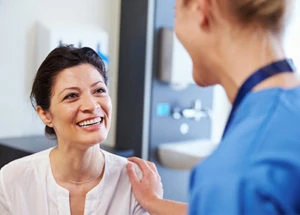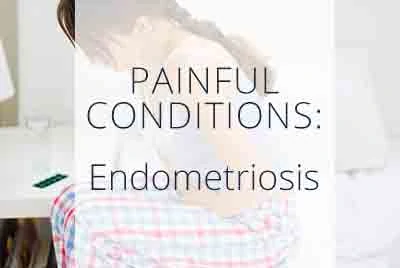Dr. Aliabadi on The Doctors discussing endometriosis treatment.
Dr. Thais Aliabadi, the nationally recognized endometriosis expert
Dr. Aliabadi has more patients than she could count who have come to her after seeing a dozen or more doctors, all of whom failed to diagnose them properly. It is one of the tragedies of modern women’s health that so many women must suffer needlessly for years from painful periods.
Endometriosis is a fairly common disorder that can cause terribly painful periods and affects over 10% of American women during their childbearing years. Most patients I diagnose are between the ages of 30-40.
Remember, painful periods are not normal!
Because endometriosis is so difficult for most doctors to diagnose, most women who come for a diagnosis and care have been suffering for an average of eleven years before being properly diagnosed!
What is endometriosis?
In normal cases, endometrial tissue lines the inside of a woman’s uterus. However, when that same tissue grows rampantly on the outside of the uterus, it is known as a medical condition called endometriosis.
This runaway tissue growth is driven as a woman’s hormones gradually build-up and is then cleared through the vagina as menstrual blood.
There are several areas where endometrial tissue can grow: the fallopian tubes, bladder, ovaries, outer lining of the uterus, or anywhere else in the pelvis.
Regardless of where it grows, symptoms of endometriosis include:
- severe pelvic pain
- irregular bowel movements
- intense cramping during menstrual cycle
- spotting or bleeding between periods
- difficulty emptying the bladder
- scarring on the pelvic organs
- fertility issues
According to the World Health Organization, endometriosis affects roughly 10% of women of reproductive age and one thing is certain, endometriosis can interfere with a woman’s quality of life.

Dr. Thais Aliabadi, Los Angeles’s best endometriosis expert
Dr. Thais Aliabadi is a nationally recognized expert in endometriosis care and has been named the best Los Angeles OBGYN and Gynecological Surgeon for six years in a row. Women from around the world visit Dr. Alaibadi to seek her medical advice and personalized treatment plans.
Dr. Aliabadi has a personal approach to patient care and has the ability to address each woman’s individual symptoms to provide the best treatment at her endometriosis center. These options range from minimally invasive laparoscopic surgery for endometriosis to birth control pills and hormone replacement therapy.
If the doctor suspects you have endometriosis, she will likely recommend exploratory surgery to confirm the diagnosis. Endometriosis cannot be diagnosed until the doctor directly views endometrial tissue growing outside the uterus.
Dr. Aliabadi uses state-of-the-art minimally invasive gynecologic surgery, promising her patients shorter recovery times, reduced pain, and the least interruption to their daily lives.
Highly-trained and honored by the medical community, Dr. Aliabadi is certified by the American Board of Obstetrics and Gynecology and a Diplomat of the American College of Obstetrics.
She is extremely involved in her community. When COVID struck, she raised more than $1 million to purchase and distribute PPE to local hospitals.
Dr. Aliabadi has been a practicing gynecologist in Los Angeles since 2002. She serves as an official gynecologist for a number of royal families and many celebrities, as well as instructing residents at Cedars Sinai Medical Center and medical students at the University of Southern California.
Non surgical treatments for endometriosis
Medications for Endometriosis Pain
Endometriosis-associated pain and cramping during menstrual periods can be managed with nonsteroidal anti-inflammatory drugs (NSAIDs) such as ibuprofen. These medications can be purchased over the counter or prescribed in stronger doses for more effective pain management.
Hormonal Therapies
Since endometriosis is hormonally driven, it can be successfully suppressed in most patients with hormonal therapies, including birth control pills (oral contraceptives with estrogen and progesterone), GnRH (gonadotropin-releasing hormone) agonists, and progestin medications, all with minimal side effects.
While these treatments won’t cure endometriosis or remove existing diseased tissue, they can reduce the appearance of new endometrial implants, prevent adhesions from forming, and provide symptom relief.
Surgical treatment for endometriosis
Although endometriosis can sometimes be managed with medication, it is often treated by an endometriosis surgeon. During this outpatient surgery, Dr. Aliabadi laparoscopically removes abnormal tissue, including endometrial implants, cysts, scar tissue and adhesions. Endometriosis surgery can significantly improve your symptoms and can also increase fertility outcomes.
Three typical goals of endometriosis excision surgery include removing an endometriosis cyst growing on an ovary, relieving acute menstrual pain, and taking out adhesions that may interfere with fertility or be causing difficulty with urination.
Laparoscopic endometriosis surgery explained

A laparoscope is a long fiber optic cable system with a light and camera that allows viewing of the pelvic area by making a few tiny incisions in the abdomen. Through this method, Dr. Aliabadi can remove harmful tissue.
Dr. Aliabadi typically performs laparoscopies at the Outpatient Hysterectomy Center, a dedicated facility that she operates with another physician. A minimally invasive laparoscopy is not near as invasive as traditional open surgery and carries less risk of infection and scarring. Patients are put under general anesthesia during the 45-minute procedure.
The long-term effectiveness of laparoscopic surgery
Laparoscopic endometriosis surgery serves as an excellent method of achieving symptom relief. However, it should not be mistaken for a cure. Surgery to treat endometriosis may improve symptoms, but it should not be thought of as a cure, it is not. Occasionally, symptoms may linger, or return after months or years — unless you incorporate hormonal therapy.
Hormone therapy can lengthen relief from pain by preventing endometrial tissue from regrowth.
Recovering from endometriosis surgery
Because laparoscopic surgery is far less invasive than a traditional open-abdomen operation, your recovery time is greatly reduced. Performed as an outpatient procedure, patients are typically able to return to work after a day or so. Complete recovery takes between two weeks and a month.
In the 24 hours after surgery, call Dr. Aliabadi or a member of her staff if you experience vomiting, chills, or fever.
Endometriosis surgery and infertility
More endometriosis is better when it comes to how effective surgery can be in improving fertility. Studies clearly indicate that women with moderate to severe endometriosis fare better than those with mild cases.
Age also plays a factor in endometriosis surgery. Women over the age of 35 may find that their chances of fertility may improve without surgery at all. Other methods of fertility treatments include in-vitro fertilization (IVF), insemination, or fertility drugs.
If you would like to establish care with Dr. Aliabadi, please click here to make an appointment or call us at (844) 863-6700.
Dr. Aliabadi offers a wide range of healthcare and wellness, including endometriosis treatment, obstetrics, menopause guidance, PCOS treatment, uterine fibroids and infertility.
The practice of Dr. Thais Aliabadi is conveniently located to patients throughout Southern California and the Los Angeles area. We are near Beverly Hills, West Hollywood, Santa Monica, West Los Angeles, Culver City, Hollywood, Venice, Marina del Rey, Malibu, Manhattan Beach, and Downtown Los Angeles.
To contact Dr. Aliabadi
Call (844) 863-6700 or request a consultation..
Dr. Aliabadi is accepting new patients.
Our location:
433 N. Camden Drive
Suite 1130
Beverly Hills, CA 90210
If you believe you are experiencing symptoms of, or suffering from Dr. Aliabadi, the best endometriosis specialist near me, or have questions about it, please see your doctor.
We also invite you to establish care with Dr. Aliabadi. Please click here to make an appointment or call us at (844) 863-6700.
A pelvic exam can provide clues that suggest the presence of endometriosis, such as tenderness in certain areas or abnormalities like cysts on the reproductive organs. However, a definitive diagnosis typically requires additional imaging tests and often a laparoscopy, where Dr. A can directly visualize and biopsy the endometrium.
To find the best endometriosis specialist near you, look for a gynecologist who specializes in endometriosis, check their credentials and experience, and read patient reviews and testimonials. Ensure the doctor uses a comprehensive and personalized approach for diagnosis and treatment.
















